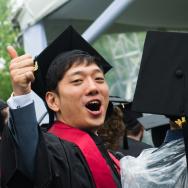When June Gordon Marks Patinkin received her bachelor’s degree in political science from the University of Chicago this month, she was the only student to have five grandchildren there to celebrate.
Patinkin, who turned 90 last year, arrived at UChicago as a 16-year-old student, taking college classes with some of the era’s most illustrious scholars. But before graduating, she left school to work for the Marshall Plan, the ambitious American effort to rebuild postwar Europe.
Patinkin remained without a degree for the next three quarters of a century until her family contacted the College asking about her transcript. Counting classes she had taken at Northwestern University, it was determined she had earned enough credits to graduate. She received her diploma with the Class of 2018 during the University’s 531st Convocation on June 9.
“I’m just thrilled,” Patinkin said. “It was a fabulous experience.”
To a round of cheers, Patinkin was the final student to traverse the stage at the College diploma ceremony in the Snell-Hitchcock quadrangle. In doing so, she became the oldest graduate of the College on record, according to the University registrar.
“We are delighted to welcome June back to the College and award her well-earned degree,” said John W. Boyer, dean of the College. “She embodies the University of Chicago’s spirit of lifelong learning and devotion to intellectual achievement. We share in her and her family’s joy.”
Patinkin’s path to her degree started in 1944. Still in high school, she began taking College classes under a program championed by then-University President Robert Maynard Hutchins, who wanted to extend classes and degrees to bright high school students.
Patinkin remembers her classes sharply, taught by some of the great midcentury scholars—Hans Morgenthau, Joseph J. Schwab, Herman Finer—many of whom had fled Europe during the war and landed at the University. “Here we were, these snot-nosed little kids, being taught by these brilliant thinkers,” she said.
She eventually transferred to Northwestern University but returned to Hyde Park and UChicago when her father fell ill. She wrote for the student newspaper, the Chicago Maroon, and became its political editor. At the time, the editor-in-chief was David Broder, who would go on to become a Pulitzer Prize-winning reporter and columnist for the Washington Post.
“Those were times of great turmoil,” she said. One of the issues she covered was the ongoing investigation of the University by the Seditious Activities Investigation Commission, known as the Broyles Commission, an anti-communist commission formed by the Illinois legislature. “We were all worried in those days about these phony investigations,” she said.
But midway through 1949, she left to travel Europe for the summer with a friend. After a summer full of adventure—they traveled all over Europe, including countries then under the Iron Curtain, where Americans weren’t allowed at the time—her friend left, but she stayed in Paris and got a job with the Marshall Plan.
The Marshall Plan would eventually distribute $13 billion to 17 European countries to rebuild shattered economies and governments in the wake of World War II. Patinkin worked in the information division, compiling information and press releases, as well as clippings and press coverage. Then her future husband Hal Patinkin, who she had met briefly before leaving for Europe, came to visit. They eloped in Paris, then returned to the United States to begin raising a family.
Over the next few years she squeezed in classes, but never received a degree, perhaps due to administrative confusion about the Hutchins early-degree program, which by then had been abandoned. Patinkin raised five sons, all of whom attended the University of Chicago Laboratory Schools; two earned graduate degrees from the University, Hugh Patinkin a law degree and Nicholas Patinkin a master of arts. She also worked as a partner and gold buyer in her family’s jewelry business, Whitehall Jewellers.
But shortly before her 90th birthday, she told her daughter-in-law, Robin Patinkin, that one of her great regrets in life was that she had never received her college degree.
“I was astounded,” Robin Patinkin said. “She’s brilliant—we all say the brains of our children came from her—so none of us had any idea.”
Robin Patinkin reached out to the College, and it was pieced together that the University had never received June Patinkin’s transcripts from her two years at Northwestern. These credits fulfilled her degree in political science. They announced it at June’s birthday party. “June kept asking if it was really true. We all had tears in our eyes,” Robin Patinkin said.
All of this led up to June 9, when June Gordon Marks Patinkin at last attended her graduation.
“It was a wonderful experience to have gone here,” she said. “It really did instill this quest for knowledge.”
